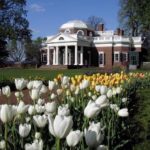Charlottesville’s Historic Downtown Mall
By Victor Block
The mansion in Virginia which Thomas Jefferson called Monticello is a perfect example of an 18th-century estate. Its 33 rooms are filled with elegant furniture and architectural touches imported from Europe.
About 10 miles away stands Pine Knot, a simpler cottage that lacks a stove, well and bathroom facilities. Theodore Roosevelt preferred its modest ambience as a place to escape from the pressures of life as president.
These two houses say much about the men who once stayed in them. They’re among the attractions in Charlottesville, Va., that bring to life chapters of the nation’s past.
Nearby is one of the places that makes Charlottesville synonymous with Thomas Jefferson. He placed high on his list of accomplishments founding the University of Virginia as an “Academical Village” available to students regardless of their birth or wealth.
Visitors see it much as it appeared when it opened for classes in 1825. Pavilions surrounding the lawn still house rooms occupied by scholars and faculty. The Rotunda which overlooks the setting is a scaled-down version of the Pantheon in Rome.
Jefferson’s architectural genius also is evident at Monticello, his beloved plantation home. Features that he introduced, many gathered when he lived in Europe, include a dumbwaiter, skylights and French doors.
In contrast to the elegance of Monticello is the modest cottage where Roosevelt stayed with his wife Eleanor. Personal touches include a list of birds which he spotted and letters to their children decorated with sketches of cartoon-like figures.
Charlottesville adds life and color to important chapters of the nation’s past. That becomes evident during strolls along the Historic Downtown Mall. The brick-paved walkway is lined by historic buildings that today house shops and restaurants. During Colonial times the route was called “Three Notch’d Road,” named for nicks carved into tree trunks to mark the way.
Introductions to two other presidential homes also support Virginia’s nickname as “The Mother of Presidents.” Four of the first five presidents, and eight in all, were born in the state.
Guides at Montpelier, the home of James Madison, describe his prominent place in history including his instrumental role in drafting the Constitution and its first 10 amendments, and serving as the fourth president. He authored a number of important documents in the rooms where visitors stand.
The Ash Lawn-Highland plantation was home to the fifth president. James Monroe negotiated the Louisiana Purchase, and the Monroe Doctrine that he established formed the cornerstone of America’s foreign policy for more than a century. Visitors are immersed in the atmosphere of a working farm, including demonstrations of spinning, weaving and open-hearth cooking.
A setting very different from plantation homes is tucked into a horseshoe bend of the James River south of Charlottesville. The village of Scottsville (population about 600) was a river port during the 18th century. Flat-bottomed boats transported tobacco, grain and other cargo to Richmond, and returned with goods imported from England and France.
A small museum recounts the story of the town and river. Exhibits in the Canal Basin Square include a packet boat, which over 150 years ago plied the James River, and a list of tariffs charged for transporting cargo and passengers. Among fares were “White person, 12 and older, 1 cent per mile” and “Coloured persons, 5 and up, 1/2 cent a mile.”
No trip to Charlottesville would be complete without at least one stop at a winery, and even here the influence of Thomas Jefferson is felt – or, rather, tasted. He planted vineyards and dreamed of producing wines equal to those of the Old World. However, a series of misfortunes doomed that effort, and for some 200 years, Virginia’s infant wine industry failed to achieve distinction.
That changed recently as local winemakers began to produce improved vintages. Virginia now has some 150 wineries and Jefferson would be proud to know that his native state is the fifth largest producer in the country.
Jefferson’s failure as a wine maker pales in comparison with his many achievements, and those of his famous neighbors, who were among the founders of our country. A visit to Charlottesville brings their stories to life in a setting as varied as were those early leaders.
For more information, call 877-386-1103 or log onto visitcharlottesville.org.













